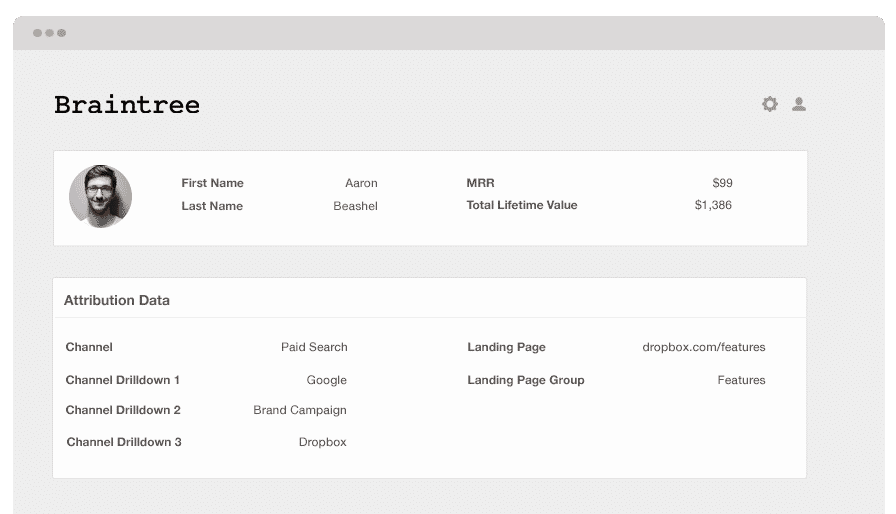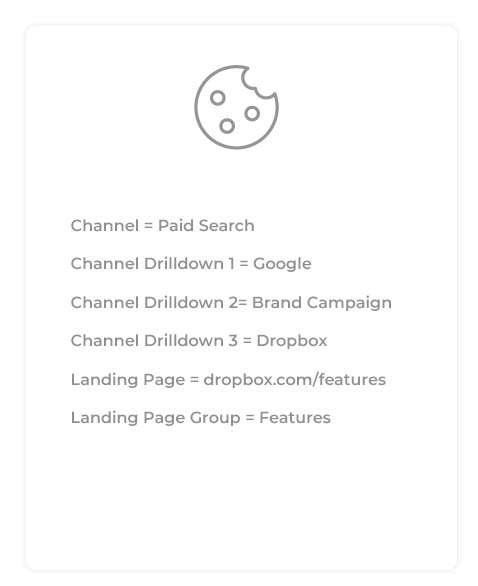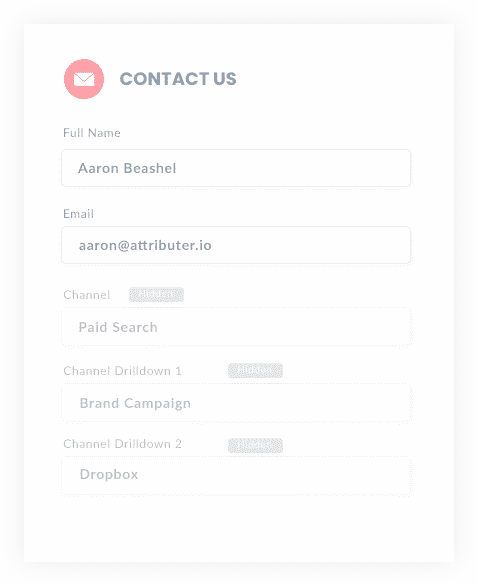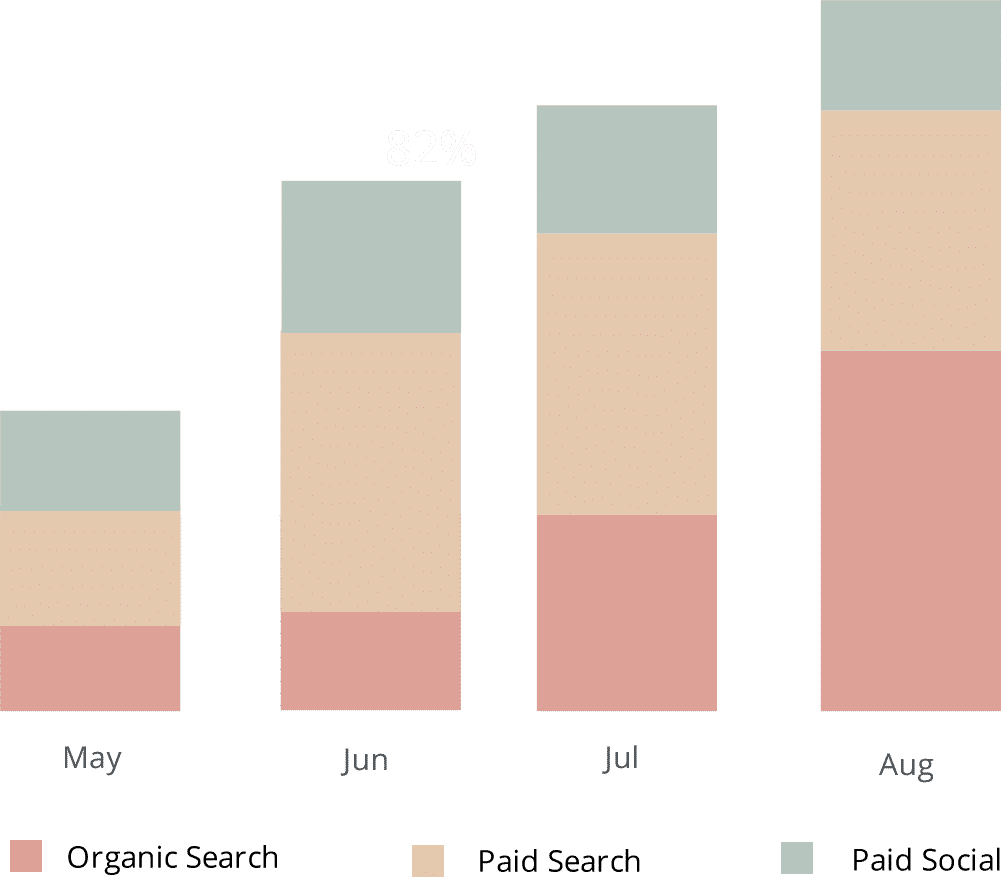How to send UTM parameters into Braintree
Learn how to send UTM parameters into Braintree so you can see what marketing channels & campaigns are generating your customers & revenue

Braintree is one of the more popular billing and customer management platforms on the market that conveniently give you the ability to run your reports that outline subscription metrics, such as ARR, MRR and Churn.
While these are great and definitely provide you with a general sense of how everything is going, to understand how to improve these numbers you would need much more detailed data.
You need to be able to break down your key revenue metrics by the marketing channels and campaigns that are driving customers so you know what to keep going on and what to stop.
Well, with Attributer, you can do just that, and in this article, we'll show you how.
What is Attributer?
Essentially, Attributer is a bit of software that runs on your website when a user arrives. It'll figure out how this particular user arrived at your site and divide it into various channels like Paid Search, Paid Social, Organic Search, storing it as a cookie in the visitor's browser.
If the user then signs up for your product, that marketing information alongside their user data will be passed into Braintree as one record.
Attributer was created by Aaron Beashel, a B2B marketing veteran who realized how difficult it could be to properly dissect which marketing channels and campaigns yielded the highest returns and which one of his marketing efforts had the highest returns.
4 steps for capturing UTM parameters in Braintree
You can easily get UTM parameters (as well as marketing attribution data for organic channels) into Braintree by following these 4 steps:
1. Add UTM parameters to your ads

Step one is to add UTM parameters to every ad and campaign you're currently running.
This will allow Attributer to use these UTM parameters to assign tracking data to the leads you capture into Braintree. Of course, most marketers do this anyway, but if you're not using UTM links, then you're missing out on a powerful tool to measure your marketing efforts.
Add UTM parameters to campaigns you have running on Facebook, LinkedIn, Instagram, Twitter, Google, Bing, etc. as well as to social media bios, guest blogs, trade publication campaigns, etc.
Essentially, wherever you have a link to your website, make sure there's a UTM link.
2. Attributer stores the UTM parameters in a cookie

Once you have implemented the Attributer script into your site, Attributer will automatically start looking for the UTM data in your visitors URLs.
And, if the UTM parameters are detected, they will then be stored in the browser cookie, ready to send into Braintree if that user signs up to become a customer of your product/service.
3. UTM parameters are sent to Braintree

Now let's say a new user arrives on your site, and after learning more about your product, they're ready to sign up for a free trial. They fill out the information required on your signup form and click 'Submit.'
When they do this, the user's personal information (I.e. their name, email, company, etc) as well as the marketing attribution data (such as the UTM parameters they arrived at your site with) are sent to Braintree.
There are two ways this can happen:
- Hidden fields in forms - You can add hidden fields to your signup forms and Attributer will write the UTM parameters into those hidden fields. That way, when users complete the signup form the UTM parameters and other marketing attribution data are captured and sent to Braintree.
- Retrieved from the cookie - A simple line of code can be added to your signup form so that the UTM parameters can be pulled from the Attributer cookie. From here, the UTM and marketing data can be passed into Braintree when the user completes your signup flow. If you give users the option to sign up for your product with Google or a social media account, this is the better option for you.
4. Run reports in Braintree

From there, Braintree will have the necessary data to generate reports for you that extend beyond the typical subscription metrics like Churn, ARR, and MRR.
Now, you will be able to break these metrics down based on the marketing channel and campaign your customers learned about you from!
Some of the metrics Braintree will be able to provide with the help of Attributer:
- New Trials added each month by Channel or Campaign
- Trial to Customer conversion rate by Channel or Campaign
- New Customers added each month by Channel or Campaign
- New MRR added each month by Channel or Campaign
- New ARR added each month by Channel or Campaign
- ARPU by Channel or Campaign
- Lifetime Value by Channel or Campaign
- Customer Churn Rate by Channel or Campaign
- MRR Churn Rate by Channel or Campaign
- And many more!
Why using Attributer is better than capturing raw UTM parameters
We know there are other UTM capturing tools out there or that you could also use to achieve this.
But Attributer delivers beyond what you can currently get from other software on the market.
1. Captures all traffic
Attributer was designed by a marketing veteran that understood that tracking organic leads are just as important as tracking paid ones. Yet, many of the UTM capturing tools out there can only provide you insights on how a customer found you if UTM parameters are present in the URL.
With that, rest assured that regardless of whether a customer finds you through paid means (Facebook ad, Google ad, LinkedIn ad, etc.) or organic means (Organic Search, Referral, Direct, etc.), Attributer will be able to capture it and pass it along to Braintree.
2. Remembers the data across multiple page views and sessions
With other UTM capturing tools out there, if a user finds you through, let's say, a Google ad, clicks it and is directed to your landing page – that user would need to sign up for your product on the landing page they are sent initially to. If they don't, the UTM parameters disappear.
This means that most tools wouldn't capture UTM data unless visitors acted in this one very linear way: Click onto ad, arrive onto the landing page, sign up, send marketing data.
But Attributer was designed to store the UTM parameters in a cookie in the user's browser instead.
This means regardless of what page the visitor completes your form on, Attributer will always be able to send the correct UTM parameters through to Braintree as it is able to pull them from the cookie.
3. Provides cleaner data
If you've worked with raw UTM parameters before, you understand how messy it can get. This is especially true if you've had various people and agencies manage your marketing channels and campaigns.
For example, some of your Facebook Ad campaigns may be tagged with UTM_Source=Facebook (capitalized), others with UTM_Source=facebook (uncapitalized), and others with UTM_Source=fb.
This becomes a little bit of a hassle when it comes to running reports in Braintree with other UTM capturing tools out there. Many would interpret this as 3 channels instead of 1, meaning you would have to connect this manually yourself.
But, Attributer has been designed to factor in for these irregularities and will, therefore, automatically stitch these channels together for you under the category of Paid Social.
4. Captures landing page data as well
Have you ever wanted to learn the actual ROI you receive from those in-depth content pieces you spend so many hours writing and organizing?
Good news – Attributer can help!
Not only does our software help capture UTM parameters and other marketing channel data, but it also captures information like the landing page and landing page category, meaning you can measure how well specific content on your site is performing.
Wrap up
If you're wanting to send UTM parameters and other marketing channel attribution data into Braintree, then Attributer is the tool for you!
So, sign up today for a 14-day free trial to see what Attributer can do for your business.
Get Started For Free
Start your 14-day free trial of Attributer today!

About the Author
Aaron Beashel is the founder of Attributer and has over 15 years of experience in marketing & analytics. He is a recognized expert in the subject and has written articles for leading websites such as Hubspot, Zapier, Search Engine Journal, Buffer, Unbounce & more. Learn more about Aaron here.
